Kimmeridge Bay, Dorset
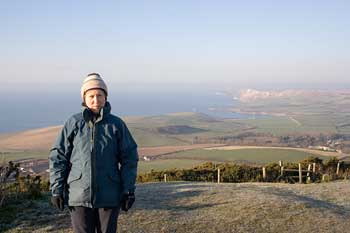
A few photos from our wonderful walk in Dorset on December 28th.

A few photos from our wonderful walk in Dorset on December 28th.
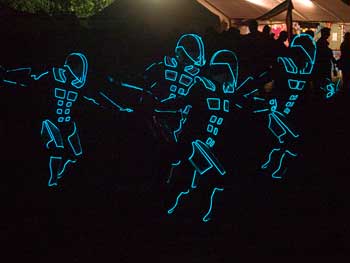 This year our summer tour took in Beautiful Days for the first time. This festival has been widely described as “like festivals used to be”. I think that phrase is meant to distinguish Beautiful Days from the sort of festival that’s sponsored by makers of lager and mobile ‘phone networks, but it must have been created by a twenty-something marketing director. I remember how festivals used to be, and they weren’t like this.
This year our summer tour took in Beautiful Days for the first time. This festival has been widely described as “like festivals used to be”. I think that phrase is meant to distinguish Beautiful Days from the sort of festival that’s sponsored by makers of lager and mobile ‘phone networks, but it must have been created by a twenty-something marketing director. I remember how festivals used to be, and they weren’t like this.
If you’ve ever seen the film of Woodstock, the archetype for later festivals, you’ll remember no food, no toilets, no information, a sea of mud, bands turning up a day late or not at all, playing on a single stage with terrible PA, interminable waits between acts, and some nasty thuggery. Contrast this with Beautiful Days:
In the festivals of my youth, you could either stand in an endless queue to be fleeced by the chicken ‘n’ chips vendor or the same for the hot dog vendor. At Beautiful Days there was a choice of tasty wholesome meals from some of the best festival caterers.
The Beatiful Days toilet fairies were constantly doing the rounds, keeping the facilities clean, fresh and well-stocked with paper.
At the festivals of old there were no children. Beautiful Days had a happy and mostly-free area dedicated to making sure the children had a good time too.
As a paid-up old fogey, I couldn’t allow that the music now is better. But there is just so much more of it. Beautiful Days offered two main stages and a dance tent, all of which ran more or less to time, and the turnarounds between the acts were effectively managed. And we did see some great performances, my highlights being Bellowhead, the Eliza Carthy Band, Billy Bragg with the acoustic Blokes (thanks for Levi Stubbs’ Tears), and my first experience of Jill Sobule.The nightly showing of Freeborn John, which allowed members of The Levellers to dress up as cavaliers, and involved the English Civil War Society in the gratuitous firing of muskets, was a “concept”, and thus unquestionably ’70s. And what a glorious show it was, too. Apparently a recording is promised. More throwbacks like this, please.
 But yes, there were some reminders of how festivals used to be:
But yes, there were some reminders of how festivals used to be:
Although Glastonbury now knows how to get 120,000 people onto the site in the manner of a military landing, a mere 10,000 of us spent two hours stationary in a traffic queue waiting to reach the Beautiful Days gate. Very nostalgic.
We’d already half-erected our tent when a short bald muscly man in uniform with walkie-talkie zoomed up self-importantly on a quad-bike and told us in the choicest language to move on, because our chosen spot was reserved for the security team. Not a very nice man, but I suspect he might have been worse if I hadn’t managed to suppress the urge to giggle at his pompousness.
The rest of our Beautiful Days photos are here.
It’s not only the music that takes us out on the festival circuit every summer; we also go for the food. Here are some of our favourites:
 Leon is peerless as a festival caterer, and has been top of our list since we first encoutered him at WOMAD in 1991. Every time I sit down to eat a meal from Leon’s, someone will come up and ask for directions to the stall where I bought it. A former Maths teacher, Leon is nearly always on the stall in person, earnestly explaining each of the dishes. At Leon’s you get a substantial meal of gourmet veggie food, made from high-quality ingredients and prepared with skill and attention to detail. His signature dish is the Leonese Plateful, a meze platter of tasty Lebanese delicacies.
Leon is peerless as a festival caterer, and has been top of our list since we first encoutered him at WOMAD in 1991. Every time I sit down to eat a meal from Leon’s, someone will come up and ask for directions to the stall where I bought it. A former Maths teacher, Leon is nearly always on the stall in person, earnestly explaining each of the dishes. At Leon’s you get a substantial meal of gourmet veggie food, made from high-quality ingredients and prepared with skill and attention to detail. His signature dish is the Leonese Plateful, a meze platter of tasty Lebanese delicacies.
The only concessions to outside catering on this stall are the disposable plates and cutlery, but never the food. Actually Leon has been known to go one step further towards the environmental goal and serve the food on edible (potato) plates.
Leon has tried a few sites at Glastonbury, but seems to have settled on the north side of the Jazz-World field, echoing his position to the side of the open-air stage at WOMAD Rivermead. Apparently he also has a devout following at Cropredy.
Manic Organic have an established site on the main path through the green fields, as it passes between the Avalon and Greenpeace fields. Also to be found at WOMAD, Beautiful Days, Big Green Gathering, …
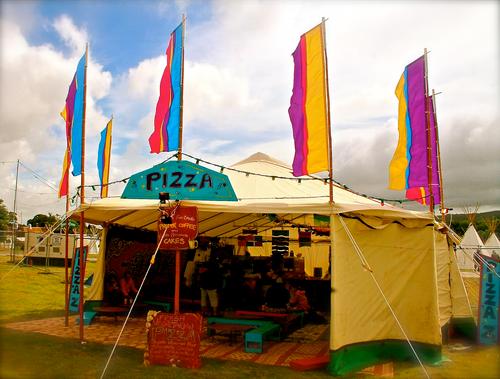 Just as you thought festival pizza was always going to be unpleasant greasy stuff best ignored, along comes the Pizza Tabun. Not a stall to visit in a hurry, because each pizza is rolled from fresh dough, topped to your specification and cooked to order in their special pizza oven. But the tent is a charming place to wait, with its comfy cushions and low tables. Unlike the previous entries, this one is also loved by the junior festival-goers, both for the pizza and the chocolate brownies. And the proprietor is a lovely man, whose manners belie his Steven Berkoff lookalike appearance.
Just as you thought festival pizza was always going to be unpleasant greasy stuff best ignored, along comes the Pizza Tabun. Not a stall to visit in a hurry, because each pizza is rolled from fresh dough, topped to your specification and cooked to order in their special pizza oven. But the tent is a charming place to wait, with its comfy cushions and low tables. Unlike the previous entries, this one is also loved by the junior festival-goers, both for the pizza and the chocolate brownies. And the proprietor is a lovely man, whose manners belie his Steven Berkoff lookalike appearance.
We first tried Pizza Tabun at the Larmer Tree festival. We’ve also found them at Glastonbury (in the Avalon field just round the corner from the Tiny Tea Tent), Beautiful Days, and the Big Green Gathering.
 The Yeo Valley stall sells the same stuff you can buy in your local supermarket; delicious organic yoghurts from a Somerset dairy farm. But while most producers hike up the price for the captive audience, Yeo Valley sell big pots of yoghurt at a discount price of £1, which makes them one of Glastonbury’s best bargains. They do frozen yoghurt too. The stall is down in Babylon in the F market area; you’ll pass it as you walk between the Pyramid and the Other Stage.
The Yeo Valley stall sells the same stuff you can buy in your local supermarket; delicious organic yoghurts from a Somerset dairy farm. But while most producers hike up the price for the captive audience, Yeo Valley sell big pots of yoghurt at a discount price of £1, which makes them one of Glastonbury’s best bargains. They do frozen yoghurt too. The stall is down in Babylon in the F market area; you’ll pass it as you walk between the Pyramid and the Other Stage.With two four-hour drives a week during the latter part of this year, I’ve had plenty of time to listen to music. 5 am at Sutton Scotney can be a surprisingly evocative time and place, and some of the most engrossing listens have with been older material that seems to suit the dark, early mornings. Laura Nyro’s 1970 Christmas and the Beads of Sweat springs to mind (Caroline doesn’t allow me to listen to that one in the house) and lately some vintage Van Morrison live recordings courtesy of EzTorrent. But, to ward off accusations of old fart-dom, it seems more appropriate to restrict the annual recommendations to music from the present millennium.
| Eliza Carthy Rough Music.
On a first listen this is less attention-grabbing than Eliza’s previous release, Anglicana. But having seen several of The Ratcatcher’s flabbergasting virtuoso live performances this year, you realise that it captures a band at the peak of ensemble playing. Eliza, Jon Boden and Ben Ivitsky’s fiddles combine in almost Bach-like counterpoint at times. And Maid On The Shore has been the J-M.org car journey singalong anthem of 2005. |

|
| Nick Cave Abbatoir Blues / The Lyre of Orpheus.
Nick released this prodigious double in 2004, but I only discovered it early this year. Abbatoir Blues is a triumph of full-blooded rock’n’poetry, with Cave haranguing about Nabokov, Larkin and Johnny Thunders on There She Goes, My Beautiful World to a backing of guitars, drums and electric bouzouki. Channel 4 showed a late-night excerpt from his show at Brixton Academy, where he was equal parts menace and sex, striding the stage while the girls in the front row slavered. The Lyre of Orpheus is quieter and marginally less interesting, but still makes up a quality double set. |
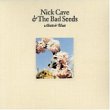
|
| Chris Wood The Lark Descending.
Many enjoyable albums emerged this year, but a single great one. Chris Wood is dour, weighty and morose, with a warm heart, slowly yielded. In other words perfectly English. The eight songs — a mix of trad. and original — are expertly crafted, yet at the same time, seem to emerge from nature, like fine sculpted oak. One In A Million is a modern-day folk song that could last as long as Lord Bateman. “She was shapely as a mermaid and her lips were red and wet, and her eyes as bright as herrings flashing in the net.” |

|
| Thione Seck Orientation.
Thione Seck is the Senegalese former vocalist of Orchestra Baobab, and has always stood in the shadow of his immensely more successful compatriot Youssou N’dour. The fates seemed to conspire against him again, when this masterful tribute to Sufism — a branch of Islam that celebrates music and love, rather than subjugation and ordeal — sat, unreleased, on the shelf for three years while Youssou released the very similar Egypt. I’m delighted that this one is now receiving the acclaim it deserves, with a nomination for the Radio 3 World Music Album of the Year. It’s elaborately arranged by Frenchman, Fran’ois Br’ant (who produced Salif Keita’s breakthrough Soro), with copious strings and occasional vocal guests, to fuse the best of Bollywood, Egypt and West Africa. |

|
| Chango Spasiuk Tarafero De Mis Pagos.
You’d not be wrong to suspect I enjoy recommending obscurities, so this Argentinian accordionist with a Ukranian Jewish heritage is right up my street! Late one evening at WOMAD this year, tired and engaged in conversation with friends, his performance gradually seeped into my consciousness and drew me in. Checking out this CD, I found it delightful. Not the tango you might expect, but a more fruity laid-back jazzy klezmer feel. |
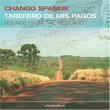
|
The mondegreen was named for this mishearing of the Scottish ballad, “They hae slain the Earl o’ Moray and layd him on the green“. Everyone has their favourite mondegreens, the gems of innocent misunderstanding which stand out from the contrived or merely smutty. The confusions of my own childhood began at school with “forgive us our Christmasses”, and progressed to Hendrix’s classic “‘Scuse me, while I kiss this guy”.
How much more fruitful for the modern child, whose parents listen to music in languages that I hadn’t even heard of at their age. The imagination can run wild when the lyrics are not in poorly enunciated English, but in Tamashek. Tinariwen’s “Got ash on my knees in Aldershot” is a car singalong favourite.
What a nice surprise to read some news that makes you proud. Apparently the British High Commission in Islamabad has a team of diplomats who rescue young British women held against their will in Pakistan. No equivocation, no mealy-mouthed excuses about culture or tradition. That stuff on the inside cover of your passport really works.
Now let’s she what she can do about a fair trial for David Hicks.
Yesterday morning, while holding a meeting in the light and airy atrium of my client’s office, I glanced towards the floor, and spotted a small bulldog clip in my trouser turn-up.
Yesterday evening, while changing into warm clothes in preparation for a trip to Anfield to watch Liverpool’s valiant but goal-less draw with Real Betis, I found a large bulldog clip attached to my trainers.
On arriving home this evening, I discovered a small bulldog clip attached to the draw-string of my coat.
Have I woken up in some enigmatic, Twin Peaks-style, drama, or is there a prankster at large’
Updates have been scarce lately, and it’s not for lack of material. The late summer festivals and many nice family outings went unreported. Rather, it’s our old friend, procrastination, and a sense of inadequacy when I read the well-turned phrases from some of my blogging heroes, that keep me from writing more often.
Time then for some inconsequential twoddle to break the writer’s block. The rock’n’roll lifestyle of an itinerant IT consultant has brought me back to Chester, where I’m a weekly guest in the City’s low-cost hotels. On a budget of £50 per night, playing the market with LateRooms, I can avoid the real dives, but not quite attain business class. These marginal places are low on luxury, but high on unintentional comedy.
Last week’s lodging was the Discomfort Inn. My stay was uneventful, save for an extractor fan fit to wake the dead, on a timer that left it running for a good twenty minutes after the bathroom light was extinguished. A trifling challenge for the road warrior — creep in darkness to the shaving light — and certainly no match for the morning a few weeks back when my entire routine of shower, shave and dress was completed in total darkness due to a blown fuse in the same hotel.
Domenica, the lovely receptionist, has a hesitant knowledge of English, but she’s hampered more by her tenuous grasp of the hotel trade. She looked dumfounded when I proffered a loyalty card; yes, the very same loyalty cards that are placed on the counter to encourage customers to pick them up and, erm, I suppose, use them. “You want to pay with this?” she asked. I gave a brief explanation of the loyalty concept but her boss’s more practical advice was better received: “Push it into this slot and press these buttons here”. A few weeks later, Domenica’s hitting her stride, but the hotel’s shaky systems throw rocks in her path. On checking out last week she asked me: “Can you tell me your Auth code?” Again, an unwarranted lecture from me about merchant acquirers and the card payment clearing system and “you really should be getting an auth code from the bank, not me”. Ten minutes later, after calling over the manager from a partner hotel across the road, my payment was finally accepted.
The Discomfort is my back-up hotel, my preference being the Second-Best Western. The drawback here is that the hotel does a roaring trade in coach parties passing through the fair City of Chester. When Caledonian Tours are in town, the place is filled with Scottish pensioners, mostly four-foot tall women named Moira or Aileen. An ill-timed visit to breakfast can find you queued behind a few dozen of them, painfully navigating the stairs with their walking sticks, belays, carabiners, hip replacements, the works. My boss, Kaye, has suggested that the reason I like the Second-Best Western is the invigorating thrill when they say “Och, I’ll let you pass with your sprightly young legs”. I can’t deny it! A while back I got a call in my room, and the dulcet voice said: “Is that you Donald?” Kaye said I should have answered: “Aye, it is, will I join you for cribbage tonight?” I’ve never sat up in the bar with the Caledonian crowd, but I wouldn’t be surprised if, after a few drams, the zimmer frames are kicked aside and Scottish country dancing begins.
Breakfast this morning brought a new Alan Bennett moment. A grey-haired couple walked into the restaurant, she clutching a small bundle wrapped in a napkin. As the waiter walked over she thrust this package at him and said in a Yorkshire accent. “Can you toast my teacake?”
The way I see it is like this. There is this kind of treasure chest you have sitting in front of you, and if you were American or perhaps Irish you might have opened it by now, but because you live here it probably hasn’t occurred to you to do so yet. Well, I would urge you to open that thing up and delve inside it, because I believe you’ll find there a sublime vision of life in the British Isles at it has been lived over the last few centuries; and it’s the kind of vision that you can’t readily get from the works of say, Dickens or Shakespeare or Elgar or Sir Christopher Wren. If you don’t open that treasure box I think you are going to miss a certain dimension, a whole dimension of cultural life in this country so I urge you to do it.
Speaking at the 2003 BBC Folk Awards, London